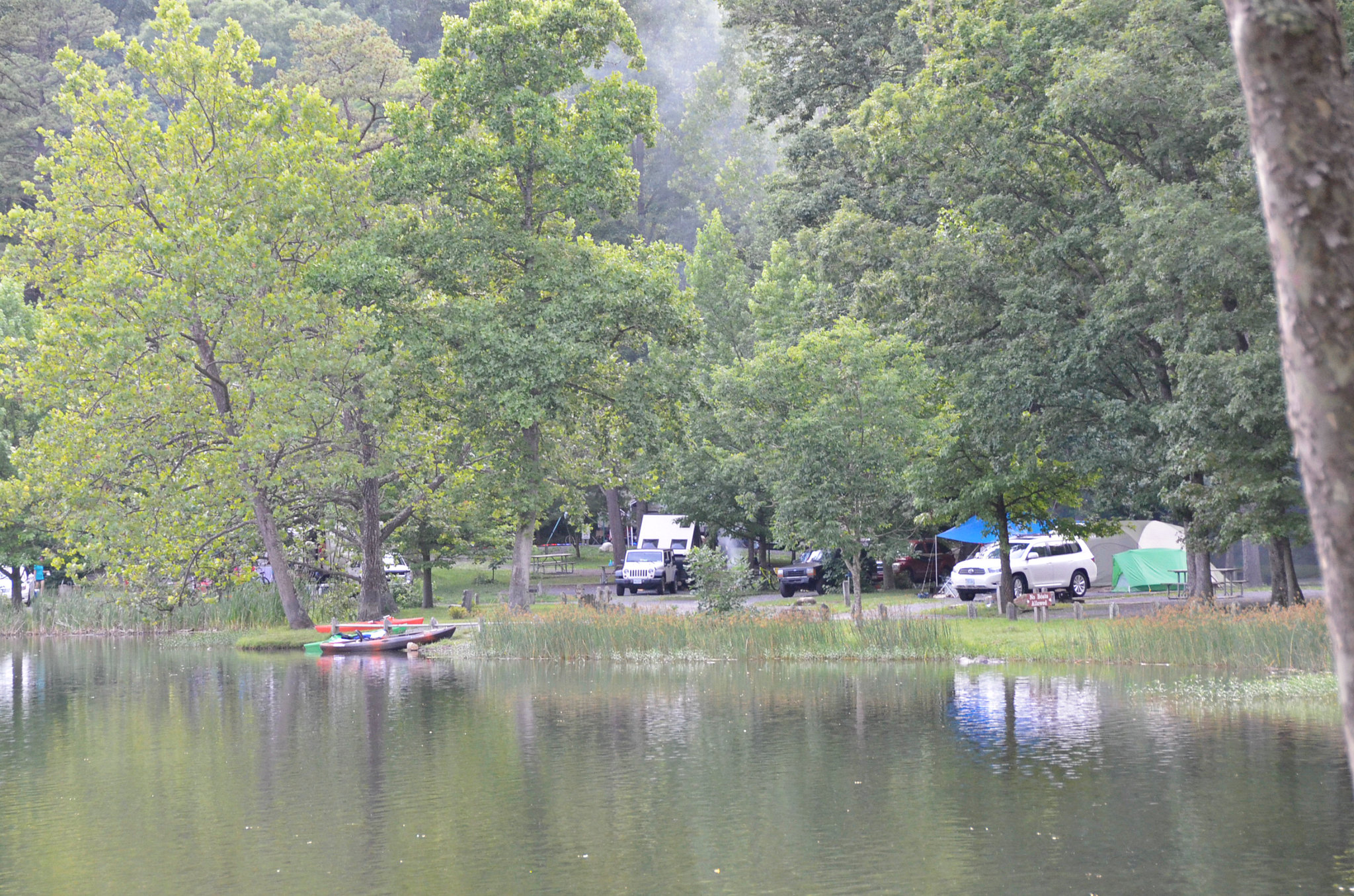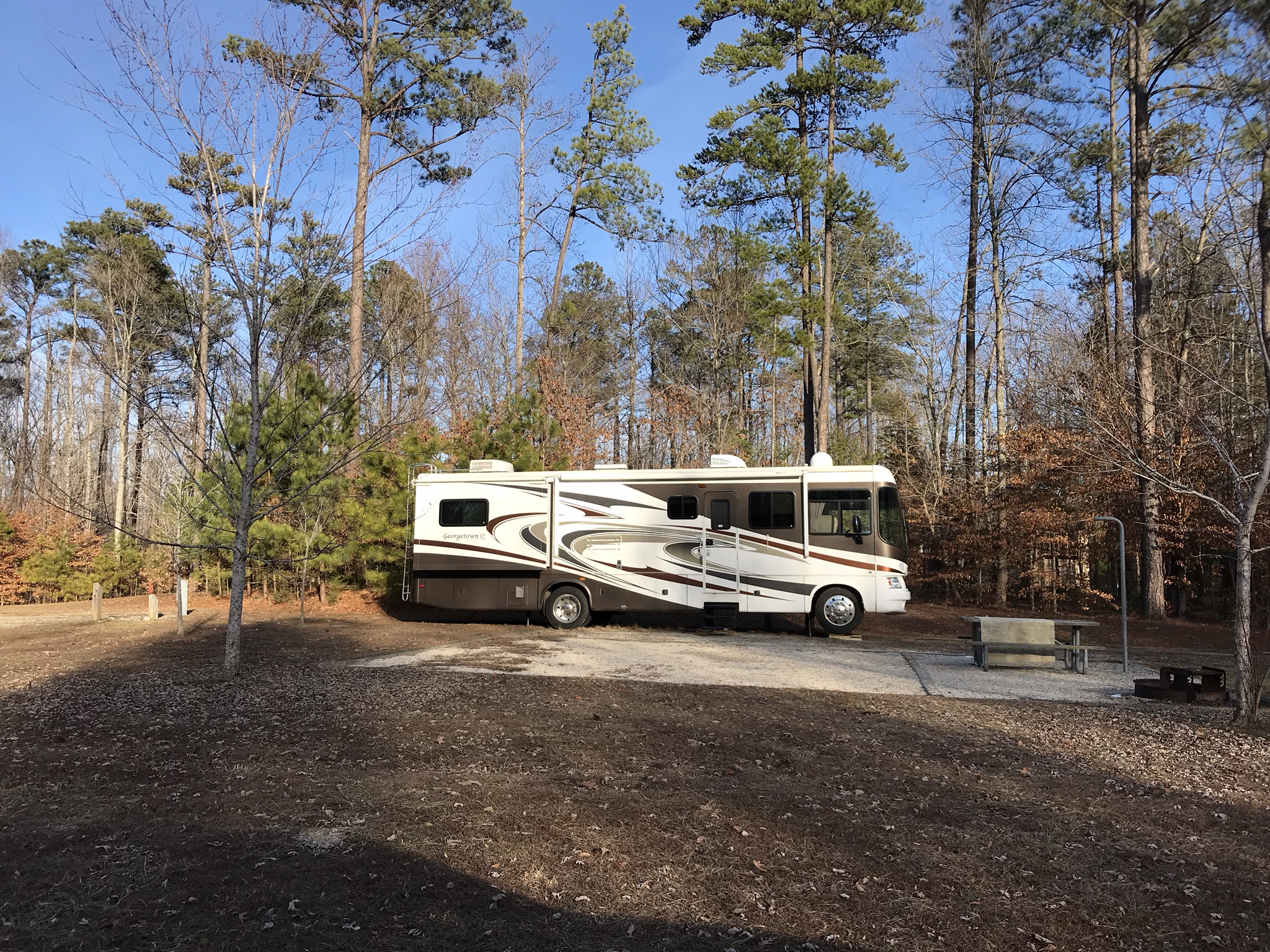One of the best things about RVing is the fact that you can choose from a variety of different camping types. For instance, some people enjoy boondocking and getting away from it all, while others enjoy the plush amenities offered at private RV parks. Meanwhile, there are those who enjoy a mixture of these two things, along with those who like something in-between: state park camping.
We adore state parks and have used the option many times throughout our travels. In this article, we are going to discuss why we do this, what you should expect when state park camping, and some of our top state park camping tips.

Why camp in State Parks?
First, let’s discuss why someone might want to camp in a state park. Actually, there are a few different reasons we’ve chosen this type of camping in the past.
- Save money
Almost every time we’ve chosen state park camping, it has saved us money. In many cases, state park campgrounds are the least expensive option near a big city or attraction. State parks are ideal for those who need to camp on a budget.
- Escape into nature
Besides being cheaper than most private parks, state park campgrounds tend to be more secluded and offer a more nature-filled camping experience. Most state park campgrounds are filled with lovely trees, plenty of shade, and even some local wildlife—all things people look for in a traditional camping trip.
- Enjoy unique offerings
In addition to presenting more nature, some state parks also offer unique experiences, making them an attraction in and of themselves.
For instance, Crater of Diamonds State Park in Arkansas offers an opportunity to dig for diamonds. Meanwhile, Blue Spring State Park in Florida gives guests the chance to get up close and personal with manatees.
What to expect from State Park camping
Not sure what to expect from camping in a state park? Well, obviously, these campgrounds vary from state to state and from park to park. Some are much nicer than others and offer more to see and do than others. That said, we can try to give you an idea of what to expect.
Generally speaking, a state park campground will offer RVers water and electric hookups at each site, dirt or gravel pads, and a communal dump station. However, some may have only water or only electric available, some may offer full hookups, and some have no hookups whatsoever. Additionally, you may sometimes find a state park campground with lovely, level cement or asphalt pads. It’s important to look into these things on Campground Reviews before booking anything.
Bathhouses are available at almost all state park campgrounds—though the cleanliness of these bathhouses varies greatly—and many have a playground somewhere in the park. Meanwhile, laundry rooms are a bit harder to come by. Still, we have found laundry rooms in some state parks, and notably, we’ve even found many state park campgrounds in Louisiana offer guests free laundry privileges!
As mentioned above, state parks tend to be hidden away in the woods, making them great places to reconnect with Mother Nature. These parks often have hiking trails available, and some have swimming beaches, boat docks, and even equestrian trails.

Tips for camping in State Parks
Does state park camping sound like your kind of camping experience? Below are some of our favorite tips. Keep these in mind to ensure your trip goes off without a hitch.
- Invest in an Annual Pass
Many states offer annual passes for their state parks. Some of these merely offer “free day” visits, but others offer free or discounted camping as well. If you’ll be camping in one state often, look into what that state offers in terms of an annual state park pass. You might just save hundreds of dollars in camping fees!
- Watch out for Day Fees
We’ve looked into staying at one or two parks that wanted to charge us day-use fees in addition to camping fees. This would have cost us as much as staying in a private park, and since the private parks in these areas offered more amenities and a better location, we ended up skipping these state parks.
- Consider buying a portable waste tank
As mentioned above, most state park campsites do not include a sewer hookup. This often means heading to the dump station to get rid of wastewater.
Unfortunately, breaking camp, driving down the road to dump the tanks, driving back, and then setting up camp again is a huge pain. This is where a portable waste tank comes in handy.
One of these boxes-on-wheels can hold all your sewage while you use your truck to pull it to where you can dump, removing the need to take the whole rig to the dump station.
- Don’t miss out
Our last tip is simply to remind you not to miss out.
Many times we will book a state park campground just because it’s near where we’d like to be, but we don’t realize just how much there is to see and do in the park itself. This often means we don’t give ourselves enough time to explore both the park and the attractions we originally came to see, and this can be a huge missed opportunity.
Don’t make this mistake. Research what the park offers and give yourself time to take advantage of it!
Check out these articles
- RV Surge Protectors, Do I really Need One?
- 5 Simple RV Security Items You Need For Your Next Trip
- 10 Things to Consider When Choosing an RV Park
Looking for a place to stay in SW Missouri? Come on by. Blue Skys RV Park has both short term and long term parking. We are a no frills, affordable, family friendly place to stay. Free Wifi and a laundromat. Whether you are looking for overnight, weekly, or long term, Blue Skys RV Park is the place to be. The owners will go above and beyond to make your stay a pleasant one. Check us out: https://blueskysrvpark.com
